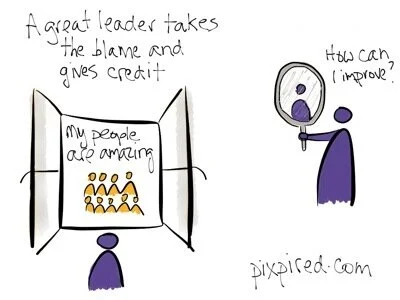Level 5 Product Leadership
Jim Collin’s Good to Great teaches that companies that make the leap to enduring greatness have a level-5 leader at their helm. It’s very comforting to see from the data that the transition from good to great stems from willful and humble leaders. There are 5 levels of leadership that build up to level-5:
Level 1: Make productive contributions through talent, knowledge, skills, and good work habits
Level 2: Contributes individual capabilities to the achievement of group objectives and works effectively with others in a group setting
Level 3: Organizes people and resources towards the effective and efficient pursuit of predetermined objectives
Level 4: Catalyzes commitment to and vigorous pursuit of a clear and compelling vision, stimulating higher performance standards
Level 5: Build enduring greatness through a paradoxical blend of personal humility and professional will
https://www.sisleadership.com/develop-the-five-levels-of-leadership-and-become-an-effective-leader/
The Level-5 Product Leader
A level 5 leader “builds enduring greatness through a paradoxical blend of personal humility and professional will.” As a product manager, you have to lead teams and groups through soft leadership, usually with no direct reports. This means being humble, keeping your ego in check, and having the professional will and discipline to consistently drive towards outcomes. While being a level-5 leader is the ultimate goal, all other levels are foundational.
Extreme Product Ownership
There’s a saying about the role of a product manager that always sits in the back of my head: if it’s not anyone else’s job, it’s your job. Product Management means ultimate accountability. This concept can be very intimidating for new product managers, but the way to manage this is actually simple. Simple but not easy. Some think of this as inspirational leadership; I’ve come to think of this as Extreme Ownership, from Navy SEAL and author Jocko Willink.
“There is no one else to blame; you must own problems along with solutions; commit to lead up and down the chain of command.” - Extreme Ownership
Again, simple but not easy. This principle and the frameworks outlined in the book Extreme Ownership provide very clear and effective tactics for achieving all 5 levels of leadership outlined in Good to Great. These tactics fall into two categories: the 4 laws of combat and mindsets for victory.
https://echelonfront.com/what-is-extreme-ownership/
https://echelonfront.com/what-is-extreme-ownership/
The Window and the Mirror
Back to Good to Great, Jim Collins invokes a different metaphor that teaches the same lesson: the window and the mirror. A level 5 leader looks in the mirror and is constantly asking, “How can I improve.” A level 5 leader also looks out the window and sees all the amazing people around them who made collective success a reality. They look out the window and humbly ask, “How did I get so lucky.”
With toxic leaders, this is the other way around. They look into the mirror and see how awesome and great they are. And when things go wrong, they look out the window and cast blame and make excuses, “Of course I failed, look at all these reasons. So many excuses!”
http://www.blind-spot-leadership.com/window-mirror/
There are no bad teams, only bad leaders
All this leads to one reoccurring fact: there are no bad teams, only bad leaders. The blunt statement put forward in Extreme Ownership resonates directly with the data out of Good to Great: a level 5 leader was the single most important factor that determined whether or not a company would make the leap from good to great. So the next time you find yourself casting blame, look inward. Be humble and put your ego in check. Remember, if it’s no anyone else’s job, it’s your job. Take ownership and lead.



